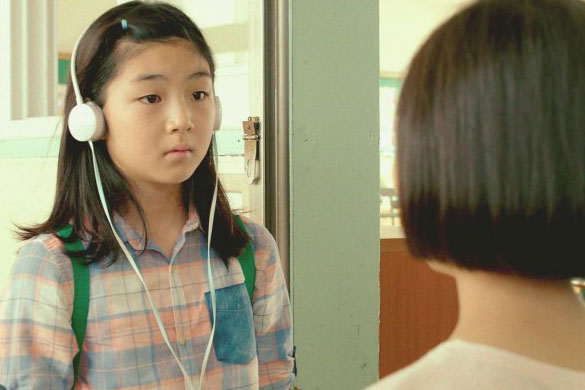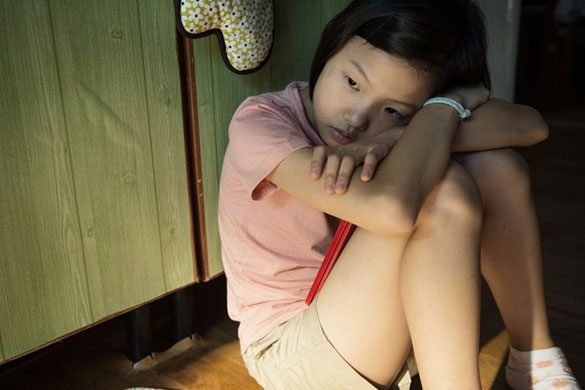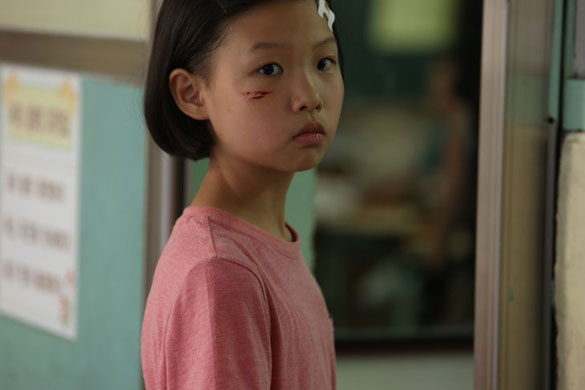"What could be wrong? She’s a kid! Kids just go to school, study and play with friends..."
Synopsis:
Sun (Choi Soo-in) is a polite, quiet ten-year-old girl who is largely ostracised at school. Not only do the ‘popular’ girls, led by Bora (Lee Seo-yeon), want nothing whatsoever to do with her in spite of her repeated, nervous and desperate efforts to make friends but they also actively take pleasure in making fun of her in plain view, even gleefully giving her the wrong address for a birthday party after duping her into doing their school cleaning chores.
During the school holidays, Sun meets Jia (Seol Hye-in) – a girl of the same age who has recently transferred from another school – and the two instantly hit it off, soon spending time at each other’s houses and quickly becoming almost inseparable, much to Sun’s excitement.
However, as the new school semester gets underway allegiances begin to shift, leaving Sun wholly confused, utterly dejected and at a complete loss as to what to do...
Review:
Take a look at virtually any period of Korean cinema and while the majority of depictions of children you’ll see have them appearing as minor (no pun intended) characters supporting adult roles within largely grown-up narratives, you will nonetheless find a fairly steady stream of films focusing on and wholly revolving around childhood, placing the thoughts, perspectives, needs and desires of the young centre stage.
Whether you consider examples from the Golden Age of the 60s and 70s, such as a six-year-old girl’s sometimes deeply devious efforts to ignite a romantic relationship between her mother and her house guest in Mother and a Guest; look at the New Korean Cinema wave of the late 90s and early 2000s to films such as The Way Home in which a young boy finds that gradually coming to understand his grandmother’s selflessness and sacrifice changes his entire outlook on life; or indeed chose far more recent films like Treeless Mountain detailing two little girls’ attempt to fill a jar with money, their mother having told them she’ll return when its full; Loveable’s tale of a young girl suffering from Savant Syndrome who takes the definition of artistic creativity to an entirely new level; or indeed director Yoon Ga-eun’s graduation short Sprout, following a seven-year-old child’s vitally important ‘mission’ across the city to obtain beansprouts for her mother, these often fairly low budget films tend to underline a much gentler and far more uplifting side to Korean cinema than any adult-oriented blockbuster ever could or would, and often in a deeply, beautifully meaningful way.
Considering the innocence of youth, and therefore its depiction, perhaps that almost goes without saying but the genuine emotional warmth these gorgeous stories of childhood regularly exude is palpable in almost every instance. Of course, not all is sweetness and light and the fact that many such films deftly critique social issues relating to children in depth – the difficulties brought by the school system, the emotional minefield of friendships and peer pressure, the sheer cruelty (emotional and/or physical) that children can so easily and almost happily inflict on each other – not only ensures that these gentle tales are both wholly worthy and indeed noteworthy but also virtually guarantees that the aforementioned warmth of proceedings will add to viewer empathy and sympathy for these young characters and their plights, even – or especially – in a narrative’s darkest moments.
 |
Those who have had the chance to see director Yoon Ga-eun’s wonderful 2013 graduation short, 'Sprout', will likely recall that it begins with a small scene in which Bory – the little heroine of the piece – watches and listens intently as family members chat about the ongoing preparations for a memorial service, the camera all the while focusing exclusively full-screen on her face. Similarly, in the first scene of ‘The World of Us’, as schoolchildren preparing for a game of dodgeball choose who they want in their team, the camera shows only ten-year-old Sun. As name after name is called out we watch as her eyes move hopefully from one team leader to the next and back while her initial happy smile starts to fall, and by the time we realise she is the last person standing unchosen her crestfallen expression speaks absolute volumes as to what’s going through her mind, without her needing to speak a single word of dialogue.
Throughout the running time of ‘The World of Us’, Yoon Ga-eun deftly yet subtly uses this technique from various angles to ensure we always know what little Sun is thinking or feeling – be it happiness, excitement, nervousness, pain or sorrow – to the extent that dialogue at times almost appears as an extra bonus to expand on what we already know she feels from the visuals through deft camera work and Choi Soo-in’s remarkably unaffected acting, rather than the other way round. As such, we come to empathise and feel for her far more naturally and indeed quickly than would be the case if we were more reliant on spoken narrative, narration or indeed exposition. They – whoever ‘they’ are – say a picture paints a thousand words, and in the case of ‘The World of Us’ that statement was never more true, standing as one of the strongest yet subtlest elements of an already exemplary film.
As if that wasn’t enough, this is perfectly extended yet further by Yoon Ga-eun’s deliberate use of (often short) dialogue that repeatedly leaves Sun not knowing what to say to make things right – her mother demanding to know why her grades have fallen, Jia’s increasingly hurtful comments and avoidance of her, and the barbed jibes of her classmates cheered on by Bora – and yet again these unanswerable questions, vague but hurtful comments and growled retorts cause her hugely emotive face behind her silence to tell us everything we need to know about her pain and confusion. Something that overly extended dialogue or exposition could never achieve and would likely actually destroy.
 |
Yoon Ga-eun uses Sun’s search for acceptance and friendship to highlight a number of social issues as they relate to and impact on the child and, to a degree, her family. The most obvious of these is of course the bullying Sun is subjected to – an theme forming a part of almost any Korean film featuring school pupils that you could care to mention – and this is in turn used as a springboard to reference yet more societal bones of contention, each being another reason for the bullying itself whether it be class differences and the fact that Sun’s family is significantly poorer than Jia’s or that of the other school kids in her class; or the huge pressure placed on Korean kids to excel in their studies and the jealousy (again leading to bullying) that can come as a result of intense test score hierarchy competition; etc.
Of course, these are all pretty heavy plot threads but Yoon Ga-eun never overplays her hand, wisely constraining their mentions to how they directly affect little Sun (and, to an extent, Jia) specifically, and as we cannot have failed to become utterly invested in this little girl’s story, the fallout these issues bring to her life, her efforts to cope, and her desperate attempts to make things right are not only what matter to us above all else but also ultimately stand as the driving force behind the entire nuanced narrative.
‘The World of Us’ is outwardly a simple story: Sun is a simple little girl with simple needs – friendship, a mobile phone to fit in with the other kids at school, and a little money to go trampolining. However, that statement belies the true depth present in the narrative. For, in trying to achieve these simple things Sun’s life becomes ever more complicated, and to my mind therein lies the film’s most significant statement:
At around the halfway mark of ‘The World of Us’, Sun’s mother is trying to talk to her about her lacklustre grades. On getting no response whatsoever from her daughter, she fears something is seriously wrong but when she voices her anxieties to her husband he simply replies “What could be wrong? She’s a kid! Kids just go to school, study and play with friends.” As adults we can be, and often are, guilty of trivialising anything that isn’t a grown-up stress or strain. We all too easily dismiss children’s wants, worries and fears as being as diminutive as their stature. With its gently poignant telling of the laughter and tears within Sun and Jia’s relationship, ‘The World of Us’ resolutely and beautifully states that a child’s world is in reality as big and as complex as any.
The acting from all in ‘The World of Us’ is top notch from start to finish, and considering the fact that the two leads are such young newcomers with next to no acting experience that really is an accolade. However, one performance stands head and shoulders above the rest – that is Choi Soo-in as ten-year-old Sun. ‘The World of Us’ is her first feature performance but her obvious sheer talent almost makes that statement hard to believe. Choi Soo-in absolutely owns the screen in each and every single frame in which she appears and, even more than that, her performance is so utterly natural that it never appears to be acting at all. Bringing the character of Sun wholly to life and making her utterly three dimensional in the process, Choi Soo-in’s performance elevates ‘The World of Us’ from exemplary to absolutely unmissable.
 |
Summary:
A gently moving story of the tumultuous relationship of two young girls, Yoon Ga-eun’s debut feature – ‘The World of Us’ – is exemplary in every respect. Highlighting both Yoon Ga-eun’s talent as a writer and director, and introducing the superlative natural acting skill of young newcomer Choi Soo-in, 'The World of Us' ultimately shows that the world of a child is as large and complex as any.
THE WORLD OF US (우리들) / 2016 / Directed by Yoon Ga-eun
|





